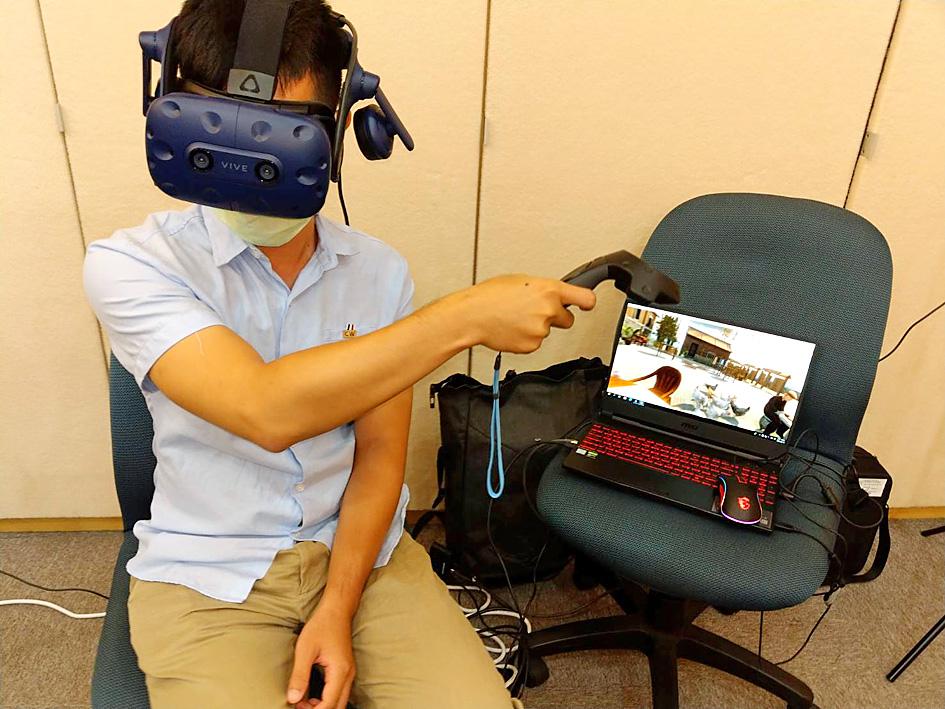The Kaohsiung Medical University Neuroscience Research Center on Monday introduced a new dementia therapy that uses virtual reality (VR) to recreate patients’ living experiences and reactivate long-term memories, to help lower their aggression levels.
At the premiere of a short film about Alzheimer’s disease, the most common type of dementia, the center unveiled the therapy, dubbed “the therapy of nostalgia,” as part of an effort to raise public awareness about the affliction.
In Taiwan, one in 12 people aged 65 or older suffers from dementia, the center said, adding that effective treatment requires pharmacological and non-pharmacological therapies.

Photo: Fang Chih-hsien, Taipei Times
The animated film — produced by a team headed by Andrew Wang (王惠鈞), a professor at Academia Sinica, and overseen by the center — uses simple language and illustrations to explain complex scientific concepts without overburdening its audience, the center said.
Explaining the new therapy, center director Yang Yuan-han (楊淵韓) said that many old men enjoy talking about their military experiences.
For them, revisiting the past through immersion in VR environments has therapeutic effects, stabilizes their mood and reduces dementia-related aggression, Yang added.
If the therapy can make use of 5G technology, production costs would be lower and access for patients would be easier, Yang said.
The standard version of the therapy features collective memories or interests shared by many older people, Yang said, adding that this would take into account the typical environments in which they grew up.
However, the VR environments can be customized and be based upon a patient’s background, he said, adding that this would usually take months of work, including visits to a patient’s home.
University president Jong Yuh-jyh (鐘育志) said that the therapy is an achievement of interdisciplinary collaboration.
The combination pharmacological and non-pharmacological therapies, including the new therapy, can stimulate patients’ cognitive functions, delay the progression of the disease and improve the quality of care, Jong said.

Chinese spouse and influencer Guan Guan’s (關關) residency permit has been revoked for repeatedly posting pro-China videos that threaten national security, the National Immigration Agency confirmed today. Guan Guan has said many controversial statements in her videos posted to Douyin (抖音), including “the red flag will soon be painted all over Taiwan” and “Taiwan is an inseparable part of China,” and expressing hope for expedited reunification. The agency last year received multiple reports alleging that Guan Guan had advocated for armed reunification. After verifying the reports, the agency last month issued a notice requiring her to appear and explain her actions. Guan

GIVE AND TAKE: Blood demand continues to rise each year, while fewer young donors are available due to the nation’s falling birthrate, a doctor said Blood donors can redeem points earned from donations to obtain limited edition Formosan black bear travel mugs, the Kaohsiung Blood Center said yesterday, as it announced a goal of stocking 20,000 units of blood prior to the Lunar New Year. The last month of the lunar year is National Blood Donation Month, when local centers seek to stockpile blood for use during the Lunar New Year holiday. The blood demand in southern Taiwan — including Tainan and Kaohsiung, as well as Chiayi, Pingtung, Penghu and Taitung counties — is about 2,000 units per day, the center said. The donation campaign aims to boost

The Kaohsiung Tourism Bureau audited six hotels in an effort to prevent price gouging ahead of Korean band BTS’ concert tour in the city scheduled for Nov. 19, 21 and 22 this year. The bureau on Friday said that the audits — conducted in response to allegations of unfair pricing posted on social media — found no wrongdoing. These establishments included the local branches of Chateau de Chine, Hotel Nikko, My Humble House, and Grand Hai Lai, it said, adding that the Consumer Protection Commission would have penalized price gougers had the accusations been substantiated. The bureau said the Tourism Development Act

The Central Weather Administration (CWA) said a magnitude 4.9 earthquake that struck off the coast of eastern Taiwan yesterday was an independent event and part of a stress-adjustment process. The earthquake occurred at 4:47pm, with its epicenter at sea about 45.4km south of Yilan County Hall at a depth of 5.9km, the CWA said. The quake's intensity, which gauges the actual effects of a temblor, was highest in several townships in Yilan and neighboring Hualien County, where it measured 4 on Taiwan's seven-tier intensity scale, the CWA said. Lin Po-yu (林柏佑), a division chief at the CWA's Seismological Center, told a news conference